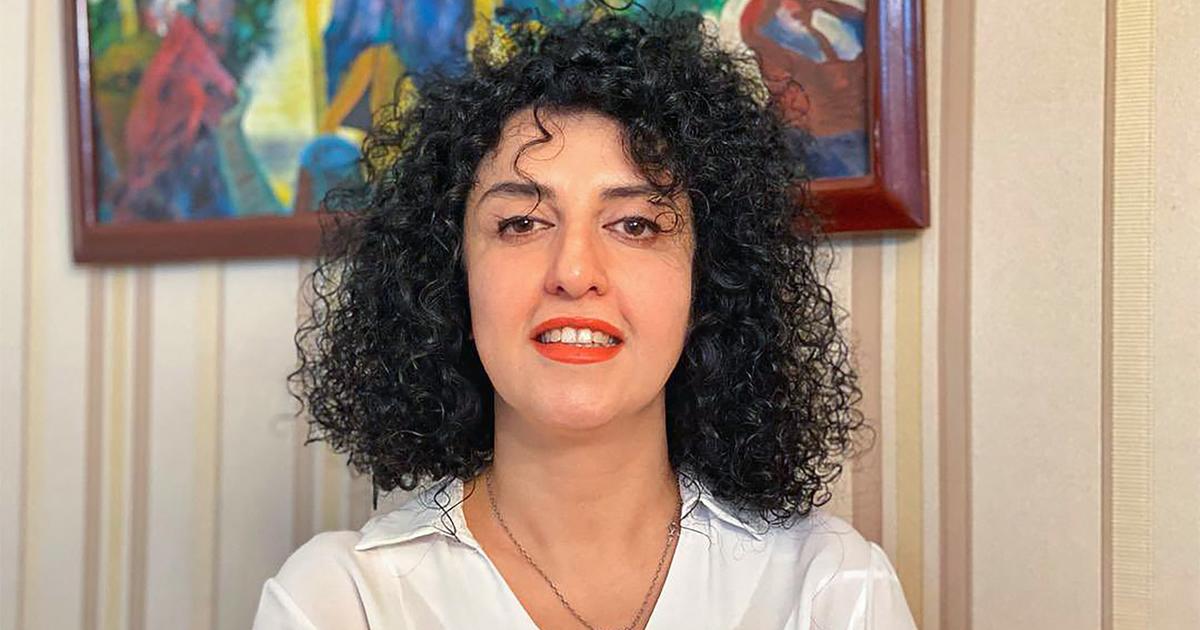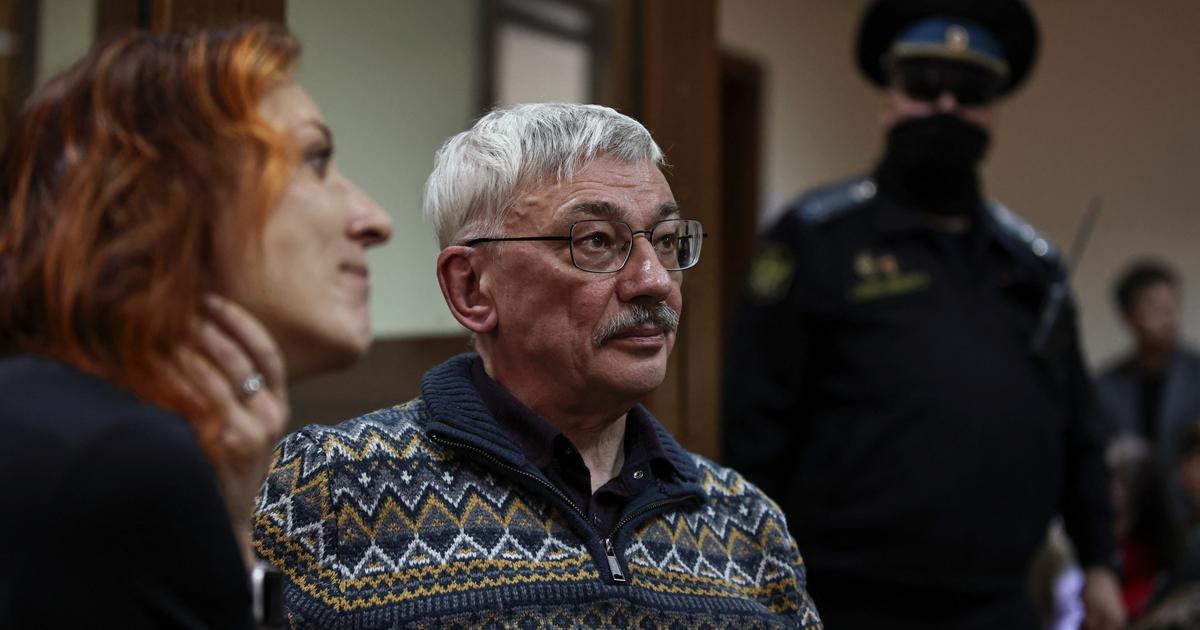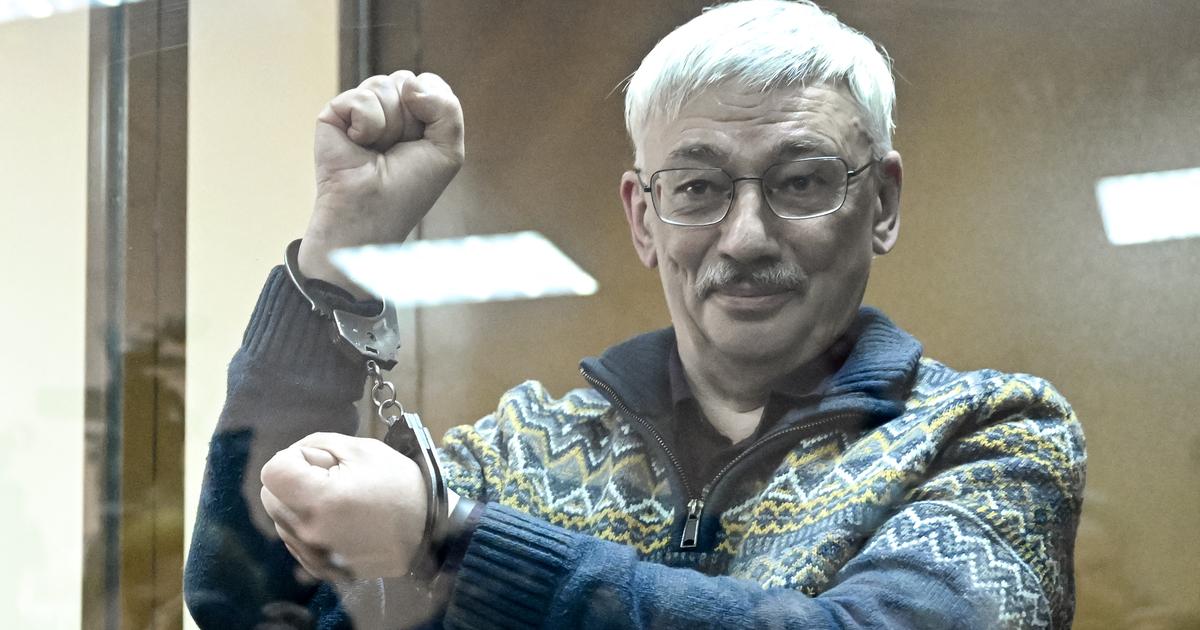Since he went into exile, Alexander Cherkasov (Moscow, 56 years old) has only carried a suitcase, some clothes and the memory of the "war crimes" committed by his country.
"Leaving was not a personal decision," suggests in French the also president of the Memorial Foundation, the organization that won the last Nobel Peace Prize together with the Ukrainian Center for Civil Liberties and the director of the Belarusian NGO Viasná, Ales Bialiatski. , imprisoned in 2021 by the authorities of the Aleksandr Lukashenko regime.
"It was a collective decision," he continued, in a gravelly voice, during a conversation with this newspaper on Sunday in a central Barcelona hotel, in which Oleksandra Romantsova and Natallia Satsunkevich, representatives of the other two winners, also participated.
This Monday and Tuesday they attend a series of citizen and institutional meetings in the Catalan capital and in Madrid.
The goal, they say, is to share their cause for peace and human rights.
History began to accelerate at the end of 2021. The Kremlin had decided to “liquidate” the association chaired by Cherkasov, ordering its closure, blocking its accounts, occupying its headquarters, such as the historic one in downtown Moscow.
Since his birth in 1987, during the opening (
glasnost
) promoted by the last president of the Soviet Union, Mikhail Gorbachev, who died recently, the Memorial had stood out as one of the last bastions of Russian consciousness in the face of terror.
"We continue the tradition of Soviet dissidence," says Cherkasov, who together with his companions have investigated crimes of Stalinism such as the purges;
or the ravages of the two wars in Chechnya (1994-96; 1999-2009) - "with between 3,000 and 5,000 citizens disappeared, in prisons, tortured or executed" -;
as well as current violations against human rights: "The history of post-Soviet Russia is a chain of wars, crimes and impunity", he criticizes.
Alexander Cherkasov, president of the Memorial Foundation, winner of the 2022 Nobel Peace Prize.
albert garcia
MORE INFORMATION
Ukraine-Russia war: latest live news
The 2006 assassination of Anna Politkovskaya flies over the conversation, on President Vladimir Putin's birthday.
The journalist from the newspaper
Nóvaya Gazeta
, critical of the Kremlin, was carrying out precisely similar investigations on what happened in Chechnya.
The director of this publication, Dimitri Murátov, won the Nobel Peace Prize in 2021, thus rewarding the fight for freedom in Russian society for two consecutive years.
The Federal Security Service (FSB), heir to the KGB, was investigating the members of Memorial.
“The same day of the invasion, [that morning of February 24, 2022], they arrested another of my colleagues,” adds the activist, who prefers not to give details of his relatives for security reasons.
He is alone.
"Just me and my suitcase," he qualifies, with a slight smile.
Also accompanying him are the documents from his investigations into the Kremlin's actions in Chechnya or Syria, a job that he now continues "with more intensity than before."
Other of his companions also had to leave Russia;
especially those “most threatened”, those who investigate the situation of political prisoners.
Together they made the decision to go into exile.
“They had started looking for me, they wanted to question me,” recalls Cherkasov,
"As I was the president of our association, my name was on the liquidation document: it was decided that I should leave the country."
A few months ago he settled in Paris.
Investigate under the bombs in kyiv
"Every day when you wake up, you don't know if that sound is an air raid alarm or just the clock."
It is the sharp voice of Oleksandra Romantsova (Mikolaiv, Ukraine, 37 years old), an economist who worked in the banking sector until she left everything to join the NGO Center for Civil Liberties (CLC), focused since 2007 on the development of the democracy in Ukraine.
This, however, until 2014, when everything changed.
"In my profession I was able to see how the criminal system of [former President Víctor] Yanukovych destroyed the future of the people, his work."
That year took place the pro-European Maidan revolution, in which Romantsova, now the executive director of the CLC, participated.
The uprising ended the government of Yanukovych, who escaped to Russia.
Oleksandra Romantsova, member of the NGO Center for Civil Liberties (CLC).Albert Garcia
It was also the year of Russia's annexation of Crimea and the start of the conflict in Donbas, prompting the CLC to start documenting war crimes.
“I had discovered that human rights organizations were the ones that could make us a better society,” he suggests.
This work now occupies a large part of the efforts of the organization, whose objective is to record evidence for a hypothetical international court to judge Russian crimes during the invasion.
The project is called
the Court for Putin
.
MORE INFORMATION
VIDEO |
Maksim Osipov, Russian writer in exile: "The greatest Russophobia is in Russia"
A few months ago, the UN began investigating accusations against the Ukrainian Armed Forces for the possible murder of 10 Russian soldiers.
Have you also received cases of potential war crimes carried out by the Ukrainian army?
Romantsova replies: “Now we have 30,000 cases in our database, the [Ukrainian] government documents 72,000.
If there is a soldier who commits an illegal act —we have encountered this possibility twice— a criminal trial is opened, the authorities react.
We document absolutely everything.
But it is important to understand the proportion of cases.
Since 2015, one or two troops have been found to torture people when they took them prisoner.
And they were put in prison."
This Monday and Tuesday the representatives of the three Nobel Prize winners visit Barcelona and Madrid on a busy schedule with institutional authorities, events organized by different associations dedicated to promoting peace.
These activities, such as the one that will take place at the Casa Encendida in Madrid (this Tuesday at 6:00 p.m.) will deal with the challenges for peace in the midst of the evolution of armed conflicts, resistance under authoritarian regimes or the current situation of human rights after the outbreak of the war in Ukraine.
"My goal is to return to Belarus"
Natallia Satsunkevich (Minsk, 34 years old) went on vacation to Egypt in January 2021 and was never able to return home.
She received a call: they told her that some of her colleagues from the Belarusian NGO Viasná were being jailed.
The director of the organization, Alés Bialiatski, distinguished along with the two aforementioned organizations with the last Nobel Peace Prize, was taken prisoner shortly after, in the middle of that year.
There are hundreds of political prisoners of the Aleksandr Lukashenko regime, especially since the fraudulent elections of 2020. Protesters are still detained.
“We decided it was better not to come back,” Satsunkevich says in English.
Since then she has settled in the capital of Lithuania, in Vilnius, where she continues the work of the organization from exile,
Since then, he confesses, he has had "many psychological difficulties."
Being away from her family, from his house, her main occupation has been to focus on work.
“But I think it was the right decision, because I am charged with the same charges as Alés and other colleagues.
My name was mentioned during a trial, they searched my apartment, they confiscated my belongings… ”, he lists.
At the end of the conversation this Sunday, Satsunkevich confesses to remaining optimistic.
His personal and social motivation converge: “My goal is to return to Belarus.
But I can only go back if the democratic changes are real, with respect for human rights”.
Follow all the international information on
and
, or in
our weekly newsletter
.
Subscribe to continue reading
Read without limits
Keep reading
I'm already a subscriber








